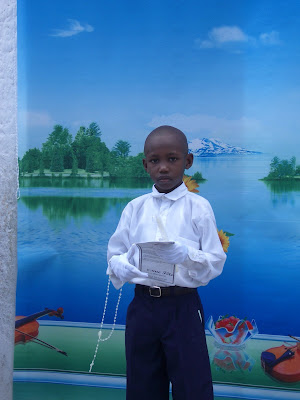I write this message from Dabonn, Haiti, a market town of maybe 50,000 people where material wealth is scarce, but a wealth of "people sharing with people" can be seen often! I've heard it said that running water, electricity, and so on are not what you need for a good life. I haven't had an experience quite like Haiti before, but it's certainly confirmed for me that creature comforts aren't necessary for me to experience happiness.
A friend here in Haiti shared with me a couple of bible verses that really relate (paraphrased here).
"For every thing that you give up, in order to follow God, God will reward you 100 times as much!" (Mark 10:29-30)
From my perspective, the main reward God will give us is the natural joy we get from sharing with others, but that's not to say rewards of material comfort are out of the question!
The other thing my friend mentioned was the verse, which I'll change slightly in paraphrase, "You can ask for absolutely anything, and if you'll use it for the purposes of Jesus and in the following of Jesus, you'll receive it!" (See Luke 7:7-9).
This reminded me of the importance of not only asking God for help, but asking others in your life to help you. Especially when they see that what you ask for is for them to help you follow where God leads, they'll often be overjoyed to help you!
So I invite you to consider, as a possibility, the joy that you might receive by giving. I'm thinking about giving time, giving things, giving what you have, by considering what you have as belonging to God. Thinking of what you have as being there so you can give it away, especially to people who have almost nothing themselves.
Consider that this way of thinking might present big changes for your life. Consider that there's nothing evil about the way you have been living, and yet there might be a possibility of a much deeper connection to God still!
They say, with love, the more you give away the more you have. I invite you to give away love like there's no tomorrow.
God has given me many gifts, and the best part about it is that the gifts enable me to give to others. Everything I have is thanks to Bondye (that's the Creole word for god) and these gifts I've been given, give me so many opportunities to share with others. I've been making an effort to consider everything that I have (my self and my possessions) as belonging to god, and relating that to Jesus' request that we take everything we have and give it to folks who have very
little themselves.
A friend here in Haiti shared with me a couple of bible verses that really relate. I don't know exactly where they are in the Bible, but here are the paraphrases:
"For every thing that you give up, in order to follow God, God will reward you 100 times as much!" (Mark 10:29-30)
From my perspective, the main reward God will give us is the natural joy we get from sharing with others, but that's not to say rewards of material comfort are out of the question!
The other thing my friend mentioned was the verse, which i'll change slightly in paraphrase, "You can ask for absolutely anything, and if you'll use it for the purposes of Jesus and in the following of Jesus, you'll receive it!" (See Luke 7:7-9).
This reminded me of the importance of not only asking God for help, but asking others in your life to help you. Especially when they see that what you ask for is for them to help you follow where God leads, they'll often be overjoyed to help you!
So I invite you to consider, as a possibility, the joy that you might receive by giving. I'm thinking about giving time, giving things, giving what you have, by considering what you have as belonging to God. Thinking of what you have as being there so you can give it away, especially to people who have almost nothing themselves.
Consider that this way of thinking might present big changes for your life. Consider that there's nothing evil about the way you have been living, and yet there might be a possibility of a much deeper connection to God still!
They say, with love, the more you give away the more you have. I invite you to give away love like there's no tomorrow.




























